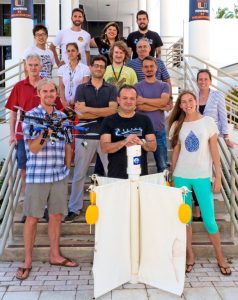Award Winning Video Teaches Drone Technology for Oil Spill Research
– March 17, 2015
The Gulf of Mexico Research Initiative congratulates the CARTHE research team for their first place award-winning video Drones at the Beach.
Over 37,000 middle school students across twenty-one countries selected the winning ocean science research videos after a two-month evaluation of the top entries that best explained scientific results and significance.
The Florida Center for Ocean Science Education Excellence (sponsor) and the National Science Foundation (funder) established the Ocean 180 Video Challenge to provide scientists a platform and an opportunity to translate research importance and outcomes to non-experts.
CARTHE’s winning video demonstrates the use of drones during their SCOPE experiment to understand how nearshore currents move contaminants in the water. One of the contest requirements was to have an accompanying peer-reviewed journal article, which the CARTHE team published in the 2015 American Meteorological Society Surf zone monitoring using rotary wing Unmanned Aerial Vehicles.
Graduate student Patrick Rynne, a member of the CARTHE video creation team, explained that the ability to communicate scientific findings is an essential skill to develop. “Although it is critical that research goes through the peer-review process, we also have a responsibility to deliver our findings in a digestible way to the public.”
Teacher Kathryn Blysma, whose students at Dr. John Long Middle School in Wesley Chapel, FL participated as judges applauded this effort to connect classroom lessons and scientific discoveries. “Too often, students only see science in isolation with the benchmarks assigned to them, rather than the real-world application of that learning,” said Blysma. “Making connections between classroom learning and the real-world is critical to being good stewards of our planet.”
The winning video was a collaborative effort that included University of Miami RSMAS graduate students and creators of Waterlust, Patrick Rynne and Fiona Graham; scientists Ronald Brouwer, Ad Reniers, and Matthieu de Schipper with Delft University; Jamie MacMahan with the Naval Postgraduate School, and CARTHE Outreach Manager Laura Bracken.
On March 26th from noon-1:00pm (EST), the annual Student-Scientist Summit will be held. During the virtual assembly, scientists affiliated with winning videos will answer questions from student judges. Attendance is free and the public is welcome to join. Click here to learn about the finalists and participating classrooms.
Credits: Patrick Rynne and Fiona Graham, Waterlust. Music: The Submarines – 1940 (AmpLive Remix) Instrumental. Filmed with GoPro Hero 3+ cameras
************
This research was made possible in part by a grant from BP/The Gulf of Mexico Research Initiative (GoMRI) to the Consortium for Advanced Research on Transport of Hydrocarbon in the Environment (CARTHE). The GoMRI is a 10-year independent research program established to study the effect, and the potential associated impact, of hydrocarbon releases on the environment and public health, as well as to develop improved spill mitigation, oil detection, characterization and remediation technologies. An independent and academic 20-member Research Board makes the funding and research direction decisions to ensure the intellectual quality, effectiveness and academic independence of the GoMRI research. All research data, findings and publications will be made publicly available. The program was established through a $500 million financial commitment from BP. For more information, visit https://gulfresearchinitiative.org/.
© Copyright 2010- 2017 Gulf of Mexico Research Initiative (GoMRI) – All Rights Reserved. Redistribution is encouraged with acknowledgement to the Gulf of Mexico Research Initiative (GoMRI). Please credit images and/or videos as done in each article. Questions? Contact web-content editor Nilde “Maggie” Dannreuther, Northern Gulf Institute, Mississippi State University (maggied@ngi.msstate.edu).






